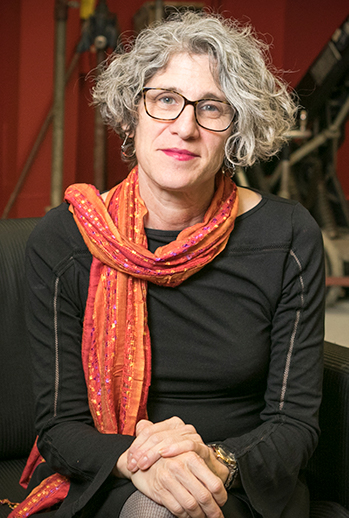
We Need Gentle Truths for Now
By Alexandra Juhasz ’86
Podcast
Our country is in the middle of an existential conversation involving hard truths and fake news. It’s a conversation many of us have only struck up recently, but Alexandra Juhasz ’86, creator of the podcast We Need Gentle Truths for Now, has been talking about this for years. Juhasz is a Distinguished Professor of Film at Brooklyn College. “I think of myself as a media studies professor and a maker of activist media,” she says. Her analytic scope covers not only cinema but also video, websites, blogs and social media. The podcast is a work of what Juhasz calls radical digital media literacy. And it’s only the latest iteration.
The seeds for the podcast were planted in late 2016. “I have a long history of thinking about both the power and problem of fake media,” Juhasz says. “I felt I could contribute something legitimate by offering reasoned thinking and access to resources around the problem of fake news.”
She began blogging on the topic daily, the fruits of which morphed into an online collection of resources from scholars and artists—a primer on digital media literacy. But while that website is useful, she says, “the way we have been schooled to be online citizens is part of the problem. We have to learn how to be more mindful, productive and generous online.”
So, in an effort to bring in more heart and generosity, Juhasz’s project pivoted into a series of Fake News Poetry Workshops. “These take place in real spaces with small groups of people engaging with fake news, with other people’s ideas, with your own ideas, and with social media by making art together,” Juhasz explains.
“Social media asks us to treat others as expendable,” she says, “to treat their ideas as unconnected to a human being with a heart, to be combative. The gentle truths that have come out of these workshops are that human beings are thoughtful, open, worried and uncertain what to do about the stranglehold of social media, and hundreds of people who have participated have written poems about that.” Still, the workshops reached only a small number of people at a time, and then, when COVID hit, everything shut down.
Enter the podcast, which has benefited from the work of Amherst interns Julia Gill ’20 and Cole Richards ’22. The name We Need Gentle Truths for Now stems from a snippet of poetry from one of those workshops, and it fits. “The podcast is very kind,” Juhasz says. “It was made to help heal during [the early months of] COVID, when people were isolated and scared.” That time period was also marked by a surge of Black Lives Matter protests, and the podcast turned out to be an excellent opportunity to respond to those as well: “We ended up doing special emergency episodes.”
In one, Juhasz’s friend P. Gabrielle Foreman ’86 talks about the Colored Conventions Project, in which she brings 19th-century-style Black organizing to digital life today—an obvious dovetail with Black Lives Matter. She did this in conversation with the poetry of her father, Kent Foreman. (See the Winter 2019 Amherst magazine for more on Foreman’s work.)
Media forums change. But the baseline questions I’m concerned with have stayed the same.”
That’s especially fitting when one considers that Juhasz’s undergraduate thesis focused on a 19th-century work: Little Women, by Louisa May Alcott, and its treatment by 20th-century Hollywood. “I was very interested in a feminist analysis of media—how people consume media, how they are nourished by it, how it changes.”
In other words, even back in the 1980s, long before social media was a thing, Juhasz was engaging with the same issues. “What I know is that media forums change,” she says. “Certain media are good at some things and others are good at other things. But the baseline questions I’m concerned with have stayed the same: How do human beings, particularly disenfranchised humans, access the beauty and full potential of meaning through media that they often can’t control? And what does it look like when they can control it?”
To answer those questions, we can start with some gentle truths. For now.
Photo by David Rozeblyum, Brooklyn College
Shulman wrote the cover story for Amherst’s Summer 2020 special issue on COVID-19.